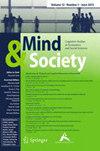The Little Prince: The Big Lesson
Q1 Arts and Humanities
引用次数: 0
Abstract
The Little Prince, a theoretical parable in itself, is capable of evoking emotions related to oneself and the societal fabric of existence in an eloquent manner. This research paper talks about The Little Prince in terms of childhood, identity, and society in the Indian context. How being busy in modern times is confounded with being productive is questioned in this paper. The notion of how development is usually understood is problematic. It is important to understand that a child is not something to be raised. Only learning from experience, freedom, and responsibility is to be fostered. The Little Prince takes us from formality to authenticity. The way of the little prince is not philosophy. His way of life is philosia, where philo means “love” and ousia means “truth.” The Little Prince reminds us that truth is not an escape, but rather the awareness of escape.It is to be noted that childhood as a cultural construction comes out to be a human choice, and the consciousness of childhood comes out to be cultural. Much of childhood remains ununderstood in terms of playing and balancing the cathartic threads of psychoanalysis, culture, and society. Through a psychosocial lens, this paper sheds light on how something hidden is always hyper-present, presenting itself by showing what it shows.《小王子:大教训
《小王子》本身就是一个理论寓言,它能够以一种雄辩的方式唤起与自己和存在的社会结构有关的情感。这篇研究论文从印度背景下的童年、身份和社会的角度来讨论《小王子》。在现代社会,忙碌是如何与富有成效混为一谈的,本文对此提出了质疑。通常如何理解发展的概念是有问题的。重要的是要明白,孩子不是什么需要抚养的东西。只有从经验中学习,才能培养自由和责任。《小王子》让我们从拘泥于形式走向真实。小王子的道路不是哲学。他的生活方式是philsia, philo的意思是“爱”,而ousia的意思是“真理”。《小王子》提醒我们,真相不是逃避,而是对逃避的意识。值得注意的是,童年作为一种文化建构产生了一种人的选择,童年意识产生了一种文化。在精神分析、文化和社会的宣泄线中玩耍和平衡,童年的大部分时间仍未被理解。通过社会心理的视角,这篇论文揭示了隐藏的东西是如何总是超present的,通过展示它所展示的东西来展示它自己。
本文章由计算机程序翻译,如有差异,请以英文原文为准。
求助全文
约1分钟内获得全文
求助全文
来源期刊

Mind and Society
Arts and Humanities-Philosophy
CiteScore
2.30
自引率
0.00%
发文量
5
期刊介绍:
Mind & Society is a journal for ideas, explorations, investigations and discussions on the interaction between the human mind and the societal environments. Scholars from all fields of inquiry who entertain and examine various aspects of these interactions are warmly invited to submit their work. The journal welcomes case studies, theoretical analysis and modeling, data analysis and reports (quantitative and qualitative) that can offer insight into existing frameworks or offer views and reason for the promise of new directions for the study of interaction between the mind and the society. The potential contributors are particularly encouraged to carefully consider the impact of their work on societal functions in private and public sectors, and to dedicate part of their discussion to an explicit clarification of such, existing or potential, implications.Officially cited as: Mind Soc
 求助内容:
求助内容: 应助结果提醒方式:
应助结果提醒方式:


